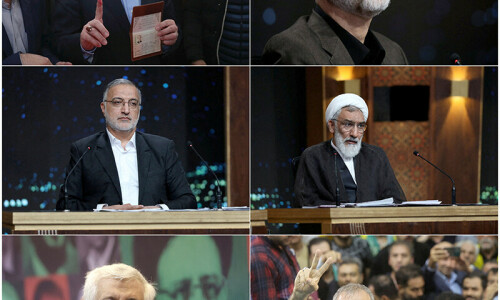Relative moderate Masoud Pezeshkian urged people on Saturday to stick with him on “the difficult road ahead” after beating a hardline rival to win Iran’s presidential election.
Friday’s run-off vote was between Pezeshkian, the sole moderate in the original field of four candidates, and hardline former nuclear negotiator Saeed Jalili.
Pezeshkian, a 69-year-old cardiac surgeon, has pledged to promote a pragmatic foreign policy, ease tensions over now-stalled negotiations with major powers to revive a 2015 nuclear pact and improve prospects for social liberalisation and political pluralism.
However, many Iranians are sceptical about his ability to fulfil his campaign promises as Supreme Leader Ayatollah Ali Khamenei, not the president, is the ultimate authority in the Islamic Republic.
“Dear people of Iran, the election is over, and this is just the beginning of our working together. A difficult road is ahead. It can only be smooth with your cooperation, empathy and trust,” Pezeshkian said in a post on social media platform X.
“I extend my hand to you and swear on my honour that I will not abandon you on this path. Do not abandon me.”

During Friday’s vote, the turnout was almost 50 per cent, following historically low turnout in the first round ballot on June 28, when over 60pc of Iranian voters abstained. The election was called after President Ebrahim Raisi was killed in a helicopter crash in May.
Pezeshkian managed to win with a constituency — whose core was believed to be mostly the urban middle class and young — that had been widely disillusioned by years of security crackdowns that stifled any public dissent from Islamist orthodoxy.
Videos on social media showed his supporters dancing in the streets in many cities and towns across the country and motorists honking car horns to cheer his victory.
In a post on X, President Asif Ali Zardari congratulated the newly elected Iranian president. “Pakistan and Iran enjoy fraternal ties & I hope that under your leadership our relations will grow further stronger,” he said.
“Looking forward to work together for the peace and prosperity of the region,” he added.
Prime Minister Shehbaz Sharif also felicitated Pezeshkian. “As neighbouring countries, Pakistan & Iran enjoy a close & historic relationship. We must ensure a bright future for our two peoples through mutually beneficial cooperation,” he said.
Gulf states, including Saudi Arabia, which restored ties with Tehran last year following a years-long rift, also congratulated Iran’s new president-elect.
King Salman, in a message to Pezeshkian, expressed hope for the “continued development of relations which link our two countries and our two brotherly peoples”, according to the official Saudi Press Agency (SPA).
He also expressed his wish for further “coordination and dialogue to strengthen regional and international peace and security”, SPA said.
The president of the United Arab Emirates, Sheikh Mohamed bin Zayed Al Nahyan, wished success to Pezeshkian and said he looks “forward to working together to further strengthen ties between the UAE and Iran for the benefit of our two nations and peoples”.
The emirs of Qatar and Kuwait sent cables of congratulations to Pezeshkian, official media reported.
Kuwait’s Emir Sheikh Meshal al-Ahmad Al-Sabah wished “more prosperity and development” for the Islamic republic, the official KUNA news agency said.
Foreign policy
Pezeshkian’s victory lifted hopes of a thaw in Iran’s relations with the West that might create openings for defusing its nuclear dispute with world powers.
The election coincided with escalating regional tension due to the conflicts between Israel and Iranian allies Hamas in Gaza and Hezbollah in Lebanon, as well as increased Western pressure on Iran over its fast-advancing nuclear programme.
Under Iran’s dual system of clerical and republican rule, the president cannot usher in any major policy shift on Iran’s nuclear programme or support for militia groups across the Middle East, since Khamenei calls all the shots on top state matters.
However, the president can influence the tone of Iran’s policy and he will be closely involved in selecting the successor to Khamenei, now 85.
Backed by Iran’s reformist camp led by former President Mohammad Khatami, Pezeshkian is faithful to Iran’s theocratic rule and has no intention of confronting the powerful security hawks and clerical rulers.















































Dear visitor, the comments section is undergoing an overhaul and will return soon.